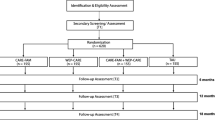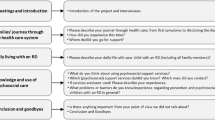Abstract
A disorder is considered a rare disease if it affects 1 in 2000, hence, while independently unique, collectively, these conditions are quite common. Many rare diseases are diagnosed during childhood, and therefore parents become primary caregivers in addition to their parental role. Despite the prevalence of rare diseases among children, there has been little research focused on parents’ experiences of navigating the healthcare system, a gap we begin to address in this study. Guided by an interpretive description methodology, participants were recruited through online listservs and posting flyers at a pediatric hospital in Western Canada. Sixteen parents (15 mothers and 1 father) participated in in-depth, semi-structured interviews between April 2013 and March 2014. Data were analyzed inductively, generating the main study themes. Findings illuminated the challenges parents’ experienced on their child’s diagnostic journey—from seeking, to receiving, to adjusting to the rare disease diagnosis. Following diagnosis, gaps, and barriers to services resulted in parents pursuing services that could support their child’s unique care needs, which often resulted in out-of-pocket payments and changes to employment. Parents found peer support, both online and in person, to be an effective resource. This study illustrates the common challenges experienced by parents of children with rare diseases as they navigate the healthcare system. Parents’ role as “expert caregiver” was rarely acknowledged by healthcare providers, pointing to the need to foster more egalitarian relationships. As well, parents were burdened with the additional role of care coordinator, a role that could be filled formally by a healthcare provider. Lastly, peer support was a key resource in terms of information and emotional support for parents who often begin their journey feeling isolated and alone. Policies and programs are needed that validate the invisible care work of parents and ensure adequate formal supports are in place to mitigate potential sources of inequity for these families. Furthermore, genetic counselors can play a key role in ensuring parents’ informational needs are addressed at the time of diagnosis and in connecting families who share common experiences regardless of the rare disease diagnosis.
Similar content being viewed by others
References
Anderson, M., Elliott, E. J., & Zurynski, Y. A. (2013). Australian families living with rare disease: experiences of diagnosis, health services use and needs for psychosocial support. Orphanet Journal of Rare Diseases, 8, 22. https://doi.org/10.1186/1750-1172-8-22.
Barriball, K. L., & While, A. (1994). Collecting data using a semi-structured interview: a discussion paper. Journal of Advanced Nursing, 19(2), 328–335. https://doi.org/10.1111/j.1365-2648.1994.tb01088.x.
Barry, M. J., & Edgman-Levitan, S. (2012). Shared decision making - the pinnacle of patient-centered care. New England Journal of Medicine, 366(9), 780–781. https://doi.org/10.1056/NEJMp1109283.
Beaulieu, C. L., Majewski, J., Schwartzentruber, J., Samuels, M. E., Fernandez, B. A., Bernier, F. P., et al. (2014). FORGE Canada Consortium: outcomes of a 2-year national rare-disease gene-discovery project. American Journal of Human Genetics, 94(6), 809–817. https://doi.org/10.1016/j.ajhg.2014.05.003.
Bogart, K. R., & Hemmesch, A. R. (2016). Benefits of support conferences for parents of and people with Moebius syndrome. Stigma and Health, 1(2), 109–121. https://doi.org/10.1037/sah0000018.
Braunstein, V. L., Peniston, N., Perelman, A., & Cassano, M. C. (2013). The inclusion of fathers in investigations of autistic spectrum disorders. Research in Autism Spectrum Disorders, 7(7), 858–865. https://doi.org/10.1016/j.rasd.2013.03.005.
Budych, K., Helms, T. M., & Schultz, C. (2012). How do patients with rare diseases experience the medical encounter? Exploring role behavior and its impact on patient–physician interaction. Health Policy, 105(2), 154–164. https://doi.org/10.1016/j.healthpol.2012.02.018.
Dellve, L., Samuelsson, L., Tallborn, A., Fasth, A., & Hallberg, L. R. M. (2006). Stress and well-being among parents of children with rare diseases: a prospective intervention study. Journal of Advanced Nursing, 53(4), 392–402. https://doi.org/10.1111/j.1365-2648.2006.03736.x.
Dodge, J. A., Chigladze, T., Donadieu, J., Grossman, Z., Ramos, F., Serlicorni, A., et al. (2011). The importance of rare diseases: from the gene to society. Archives of Disease in Childhood, 96(9), 791–792. https://doi.org/10.1136/adc.2010.193664.
Farmer, J. E., Marien, W. E., Clark, M. J., Sherman, A., & Selva, T. J. (2004). Primary care supports for children with chronic health conditions: identifying and predicting unmet family needs. Journal of Pediatric Psychology, 29(5), 355–367. https://doi.org/10.1093/jpepsy/jsh039.
Forsythe, L. P., Szydlowski, V., Murad, M. H., Ip, S., Wang, Z., Elraiyah, T. A., et al. (2014). A systematic review of approaches for engaging patients for research on rare diseases. Journal of General Internal Medicine, 29(S3), 788–800. https://doi.org/10.1007/s11606-014-2895-9.
Glenn, A. D. (2015). Using online health communication to manage chronic sorrow: mothers of children with rare diseases speak. Journal of Pediatric Nursing:Nursing Care of Children and Families, 30(1), 17–24. https://doi.org/10.1016/j.pedn.2014.09.013.
Grut, L., & Kvam, M. H. (2013). Facing ignorance: people with rare disorders and their experiences with public health and welfare services. Scandinavian Journal of Disability Research, 15(1), 20–32. https://doi.org/10.1080/15017419.2011.645870.
Herder, M., & Krahn, T. M. (2016). Some numbers behind Canada’s decision to adopt an orphan drug policy: US orphan drug approvals in Canada, 1997-2012. Healthcare Policy, 11(4), 70–81. https://doi.org/10.12927/hcpol.2016.24626.
Housser, E., Mathews, M., LeMessurier, J., Young, S., Hawboldt, J., & West, R. (2013). Responses by breast and prostate cancer patients to out-of-pocket costs in Newfoundland and Labrador. Current Oncology, 20(3), 158–165. https://doi.org/10.3747/co.20.1197.
Huyard, C. (2009). What, if anything, is specific about having a rare disorder? Patients’ judgements on being ill and being rare. Health Expectations, 12(4), 361–370. https://doi.org/10.1111/j.1369-7625.2009.00552.x.
Kesselheim, A. S., McGraw, S., Thompson, L., O’Keefe, K., & Gagne, J. J. (2015). Development and use of new therapeutics for rare diseases: views from patients, caregivers, and advocates. The Patient - Patient-Centered Outcomes Research, 8(1), 75–84. https://doi.org/10.1007/s40271-014-0096-6.
Longo, C. J., & Bereza, B. G. (2011). A comparative analysis of monthly out-of-pocket costs for patients with breast cancer as compared with other common cancers in Ontario, Canada. Current Oncology, 18(1), E1–E8. https://doi.org/10.3747/co.v18i1.681.
MacKean, G. L., Thurston, W. E., & Scott, C. M. (2005). Bridging the divide between families and health professionals’ perspectives on family-centred care. Health Expectations, 8(1), 74–85. https://doi.org/10.1111/j.1369-7625.2005.00319.x.
McAllister, M. (2001). Grounded theory in genetic counseling research. Journal of Genetic Counseling, 10(3), 233–250. https://doi.org/10.1023/A:1016628408498.
McConkie-Rosell, A., Hooper, S. R., Pena, L. D. M., Schoch, K., Spillmann, R. C., Jiang, Y.-H., et al. (2018). Psychosocial profiles of parents of children with undiagnosed diseases: managing well or just managing? Journal of Genetic Counseling, 27(4), 935–946. https://doi.org/10.1007/s10897-017-0193-5.
Menon, D., Clark, D., & Stafinski, T. (2015). Reimbursement of drugs for rare diseases through the public healthcare system in Canada: where are we now? Healthcare Policy, 11(1), 15–32. https://doi.org/10.12927/hcpol.2015.24360.
Neely-Barnes, S. L., & Dia, D. A. (2008). Families of children with disabilities: a review of literature and recommendations for interventions. Journal of Early and Intensive Behavior Intervention, 5(3), 93–107. https://doi.org/10.1037/h0100425.
Pelentsov, L. J., Laws, T. A., & Esterman, A. J. (2015). The supportive care needs of parents caring for a child with a rare disease: a scoping review. Disability and Health Journal, 8(4), 475–491. https://doi.org/10.1016/j.dhjo.2015.03.009.
Rabeharisoa, V., Callon, M., Filipe, A. M., Nunes, J. A., Paterson, F., & Vergnaud, F. (2014). From ‘politics of numbers’ to ‘politics of singularisation’: patients’ activism and engagement in research on rare diseases in France and Portugal. Biosocieties, 9(2), 194–217. https://doi.org/10.1057/biosoc.2014.4.
Ryan, F., Coughlan, M., & Cronin, P. (2009). Interviewing in qualitative research: the one-to-one interview. International Journal of Therapy and Rehabilitation, 16(6), 309–314. https://doi.org/10.12968/ijtr.2009.16.6.42433.
Sandelowski, M. (1995). Samplesize in qualitative research. Research in Nursing & Health, 18(2), 179–183. https://doi.org/10.1002/nur.4770180211.
Schieppati, A., Henter, J.-I., Daina, E., & Aperia, A. (2008). Why rare diseases are an important medical and social issue. The Lancet, 371(9629), 2039–2041. https://doi.org/10.1016/S0140-6736(08)60872-7.
Smith, J., Cheater, F., & Bekker, H. (2015). Parents’ experiences of living with a child with a long-term condition: a rapid structured review of the literature. Health Expectations, 18(4), 452–474. https://doi.org/10.1111/hex.12040.
Spillmann, R. C., McConkie-Rosell, A., Pena, L., Jiang, Y. -H., Schoch, K., Walley, N., et al. (2017). A window into living with an undiagnosed disease: illness narratives from the undiagnosed diseases network. Orphanet Journal of Rare Diseases, 12, 71. https://doi.org/10.1186/s13023-017-0623-3.
Thorne, S., Kirkham, S. R., & O'Flynn-Magee, K. (2004). The analytic challenge in interpretive description. International Journal of Qualitative Methods, 3(1), 1–11. https://doi.org/10.1177/160940690400300101.
von der Lippe, C., Diesen, P. S., & Feragen, K. B. (2017). Living with a rare disorder: a systematic review of the qualitative literature. Molecular Genetics & Genomic Medicine, 5(6), 758–773. https://doi.org/10.1002/mgg3.315.
Woodgate, R. L., Edwards, M., & Ripat, J. (2012). How families of children with complex care needs participate in everyday life. Social Science & Medicine, 75(10), 1912–1920. https://doi.org/10.1016/j.socscimed.2012.07.037.
Zurynski, Y., Frith, K., Leonard, H., & Elliott, E. (2008). Rare childhood diseases: How should we respond? Archives of Disease in Childhood, 93(12), 1071–1074. https://doi.org/10.1136/adc.2007.134940.
Acknowledgements
We are grateful to the participants in this study for their time and expertise.
Author Contributions Section
J. Baumbusch made substantial contributions to the conception of the work, the acquisition, analysis, and interpretation of the data and drafted the initial manuscript and revision and gave final approval of the version to be published and agrees to be accountable for all aspects of the work.
S. Mayer made substantial contributions to the acquisition, analysis, and interpretation of the data and assisted in drafting the initial manuscript and revision and gave final approval of the version to be published and agrees to be accountable for all aspects of the work.
I. Sloan Yip made substantial contributions to the analysis and interpretation of the data and assisted in drafting the initial manuscript and revision and gave final approval of the version to be published and agrees to be accountable for all aspects of the work.
Funding
Funding for this research was provided by the Rare Disease Foundation.
Author information
Authors and Affiliations
Corresponding author
Ethics declarations
Conflict of Interest
Jennifer Baumbusch, Samara Mayer, and Isabel Sloan-Yip declare that they have no conflict of interest.
Human Studies and Informed Consent
All procedures followed were in accordance with the ethical standards of the responsible committee on human experimentation (The University of British Columbia Behavioural Research Ethics Board) and with the Helsinki Declaration of 1975, as revised in 2000. Informed consent was obtained from all participants for being included in the study.
Animal Studies
No animal studies were carried out by the authors for this article.
Rights and permissions
About this article
Cite this article
Baumbusch, J., Mayer, S. & Sloan-Yip, I. Alone in a Crowd? Parents of Children with Rare Diseases’ Experiences of Navigating the Healthcare System. J Genet Counsel (2018). https://doi.org/10.1007/s10897-018-0294-9
Received:
Accepted:
Published:
DOI: https://doi.org/10.1007/s10897-018-0294-9




